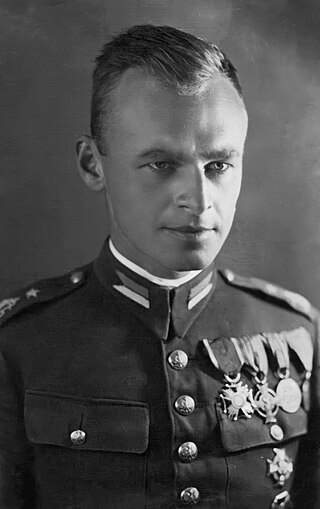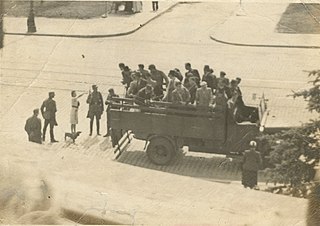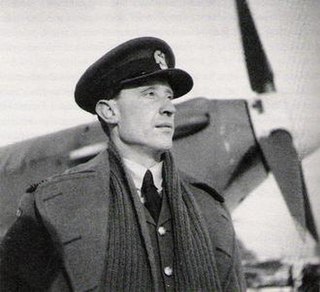
Witold Pilecki was a Polish World War II cavalry officer, intelligence agent, and resistance leader.

Łapanka ( ) was the Polish name for a World War II practice in German-occupied Poland, whereby the German SS, Wehrmacht and Gestapo rounded up civilians on the streets of Polish cities. The civilians arrested were in most cases chosen at random from among passers-by or inhabitants of city quarters surrounded by German forces prior to the action.

Michael Alfred Peszke was a Polish-American psychiatrist and historian of the Polish Armed Forces in World War II.

Witold Urbanowicz was a Polish fighter ace of the Second World War. According to the official record, Witold Urbanowicz was the second highest-scoring Polish fighter ace, with 17 confirmed wartime kills and 1 probable, not counting his pre-war victory. He was awarded with several decorations, among others the Virtuti Militari and British Distinguished Flying Cross. He also published several books of memoirs.
Józef Garliński was a Polish historian and prose writer. He was a survivor of Auschwitz concentration camp and wrote books on the history of World War II, some of which were translated into English. In particular, his book Fighting Auschwitz, translated into English in 1975, became a best-seller.

The Polish resistance movement in World War II, with the Polish Home Army at its forefront covered both German and Soviet zones of occupation. The Polish resistance is notable among others for disrupting German supply lines to the Eastern Front, and providing intelligence reports to the British intelligence agencies. It was a part of the Polish Underground State.

The issue of why the Allies did not act on early reports of atrocities in the Auschwitz concentration camp by destroying it or its railways by air during World War II has been a subject of controversy since the late 1970s. Brought to public attention by a 1978 article from historian David Wyman, it has been described by Michael Berenbaum as "a moral question emblematic of the Allied response to the plight of the Jews during the Holocaust", and whether or not the Allies had the requisite knowledge and the technical capability to act continues to be explored by historians. The U.S. government followed the military's strong advice to always keep the defeat of Germany the paramount objective, and refused to tolerate outside civilian advice regarding alternative military operations. No major American Jewish organizations recommended bombing.

The "cursed soldiers" or "indomitable soldiers" is a term applied to a variety of anti-Soviet and anti-communist Polish resistance movements formed in the later stages of World War II and its aftermath by members of the Polish Underground State. This all-encompassing term for a widely heterogeneous movement was introduced in the early 1990s.

The Scouting and Guiding movement in Poland consists of about twelve independent organizations with an overall membership of about 160,000 Scouts and Guides. The largest organization by membership is Polish Scouting and Guiding Association with about 140,000 members.
Związek Organizacji Wojskowej, abbreviated ZOW, was an underground resistance organization formed by Witold Pilecki at Auschwitz concentration camp in 1940.

The Chrobry II Battalion was a unit, formally subordinate to the Polish Home Army (AK), which took part in the Warsaw Uprising. It was named after the Polish king Bolesław I Chrobry.

Squadron 303 is a non-fiction book written by Polish author Arkady Fiedler and published by Peter Davies. It became his most popular book, selling over 1.5 million copies. Written in 1940, published in August 1942, the book is about the legendary No. 303 ("Kościuszko") Polish Squadron of Polish Air Force fighter pilots who flew with Great Britain's Royal Air Force (R.A.F.) during the Battle of Britain.

Witold's Report, also known as Pilecki's Report, is a report about the Auschwitz concentration camp written in 1943 by Witold Pilecki, a Polish military officer and member of the Polish resistance. Pilecki volunteered in 1940 to be imprisoned in Auschwitz to organize a resistance movement and send out information about the camp. He escaped from Auschwitz in April 1943. His was the first comprehensive record of a Holocaust death camp to be obtained by the Allies.

Piotr Śmietański was a Polish non-commissioned officer and communist functionary in the Ministry of Public Security and executioner at Mokotów Prison.

The organization of underground resistance movements in Auschwitz concentration camp began in the second half of 1940, shortly after the camp became operational in May that year. In September 1940 Witold Pilecki, a Polish army captain, arrived in the camp. Using the name Tomasz Serafiński, Pilecki had allowed himself to be captured by Germans in a street round up (łapanka) with the goal of having himself sent to Auschwitz to gather information and organize resistance inside. Under Pilecki's direction the Związek Organizacji Wojskowej, ZOW, was formed.
Tadeusz Arentowicz was a Polish fighter pilot and ace during the Second World War. He served as a flight Lieutenant in the Royal Air Force in the No. 303 Polish Fighter Squadron. He was B-group Flight Commander of the squadron. A week after his final promotion, in 1941, he was on a mission escorting bombers when his plane was shot down by a German fighter near Dunkirk over the English Channel; he was never found.

The Volunteer: The True Story of the Resistance Hero Who Infiltrated Auschwitz is a 2019 book which presents research by British writer Jack Fairweather, a former Washington Post war correspondent, into the life of Witold Pilecki, a Polish soldier and Home Army resistance fighter who infiltrated the infamous Auschwitz concentration camp. The book was met with positive reception from critics and won the Costa Book Awards – Book of the Year prize that year.

The Auschwitz Volunteer: Beyond Bravery is a nonfiction 2012 book consisting of a report by Polish resistance fighter Witold Pilecki, an introduction written by historian Norman Davies and a foreword by Chief Rabbi of Poland Michael Schudrich. The diary has been translated by Jarek Garliński and was published in English by Aquila Polonica. It covers a period of about four years during which Pilecki was on a mission to infiltrate the Auschwitz concentration camp. Pilecki wrote his report in Polish in the summer of 1945 for his Polish Army superiors; this book was the first time his report was published in English. His mission had two principal goals: smuggle out intelligence about the camp, and build a resistance organization among the prisoners.
Fighting Auschwitz: The Resistance Movement in the Concentration Camp is a 1975 book by Polish historian Józef Garliński about the resistance movement in Auschwitz, published by Julian Friedmann Publishers. The book's primary focus is the Związek Organizacji Wojskowej underground organization formed by the Polish resistance fighter, Witold Pilecki, known for infiltrating the Auschwitz concentration camp to organize resistance on the inside. The book, despite being close to 50 years old, is still considered a "definitive study of the topic" by modern scholars.















